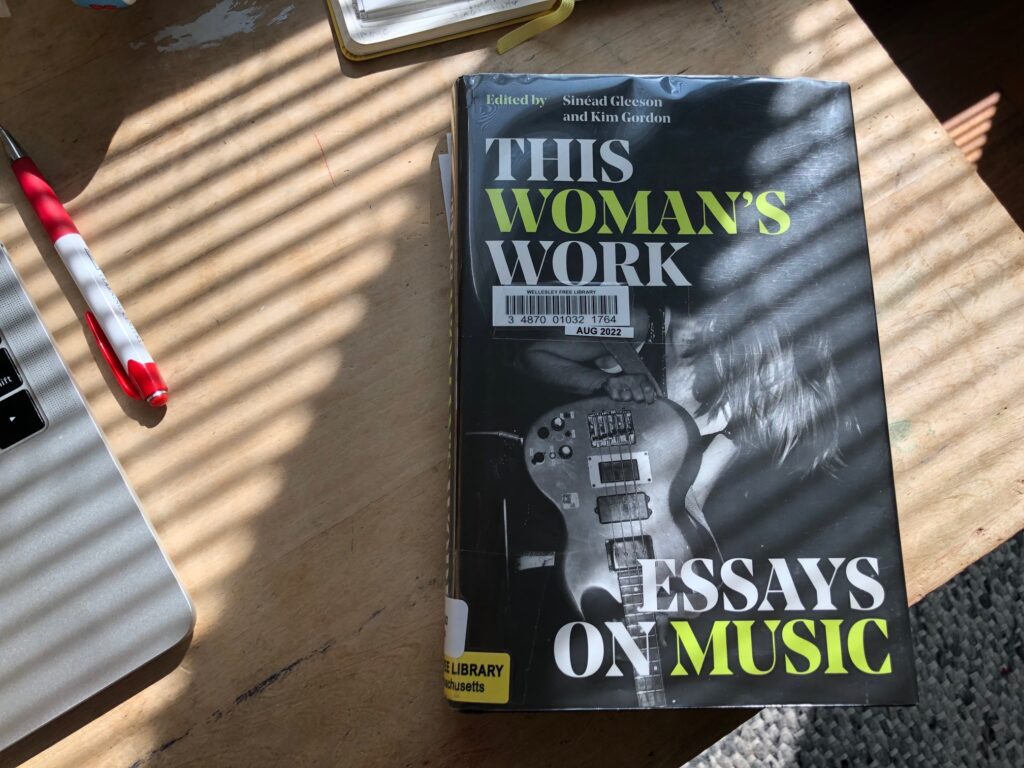Writing about music
Some pompous professor at a faculty party long ago told me that “writing about music is like dancing about architecture.”
I was there at the wine-and-cheese in my official capacity of Nobody, and I didn’t know he was just tossing off a well-worn cliché of uncertain origin; I thought he’d brilliantly made it up on the spot in response to me chatting about my work in progress at the time – a novel about the members of a string quartet. No matter; his assertion that music cannot be captured – perhaps not even approached – by words set me back quite a few steps in my writing.
But it also put a bug in my brain. Every time I read a piece of writing that touches on, dances around, or launches off music, I send a psychic vibration back to that distant conversation, saying, “see, it can be done.”
This week, reading the essay collection “This Woman’s Work” sent seismic quakes toward that long-vanished point in space-time. Edited by Sinéad Gleeson and Kim Gordon, the book gathers 16 essays by women who use concrete experiences of music – a mix tape, a favorite song, an embarrassing encounter with a rock star – to open up larger stories.

I couldn’t stop reading these. Most memorable to me:
- Anne Enright tells a funny story about becoming speechless in the presence of Laurie Anderson and ends up writing about fame. Or The Fame Thing, as she calls it.
- Leslie Jamison meditates on love, power and empowerment in “An Essay in Eight Mix Tapes,” catching my interest because HEY, I MADE, GAVE, RECEIVED AND LOVED MIX TAPES BACK IN THE DAY, TOO and so of course her remembrances sent me back to my remembrances.
- Kim Gordon (a founding member of the post-punk rock band Sonic Youth) interviews Japanese musician Yoshimi, whose out-of-the-box approach to creativity, at once wildly original and grounded, reminds me of life’s beautiful possibilities. Even if I’m not the one playing the drums in a nightclub while wearing days-of-the-week panties on my head, someone else is, and that’s a breath of fresh air. Plus Gordon and Yoshimi performed for a while as a duo called “Free Kitten,” which just makes me want to take a day off to make up band names.
- In an essay titled “Loser,” Megan Jasper describes what it was like to be one of the early employees of Sub Pop records in 1989/the early 1990s, when ‘grunge wildfire’ was spreading across the world from its epicenter in Seattle. Her receptionist desk sums it up: “Charles Peterson, our then-UPS guy who became an internationally famed rock photographer, brought me an old wooden desk from the seventies. It was shaped like a kidney bean and had a red top. I found every sticker in the office and started covering the desk. On the very front was a sticker that said ‘I hate your band.’” I can’t read this without thinking of the black t-shirt one of the guys on my track team wore before races. It said “Loser” across the front, “Sub Pop” on the back. He ran with a gangly, awkward stride, feet pointing out in third position, and he won every single 800 meter race he entered.
- Yiyun Li connects a solo trip she took across west Texas in a rental car with childhood memories of music: her own discovery, in China, of ‘Auld Lang Syne’ and her son’s passion for Les Misérables. She concludes with a reminder that ‘Arts are only placeholders for life. Some are masterful placeholders, some less so; but all the same it is the life held by those holders that has to be lived through. One does not wrestle with life’s placeholders, but with life itself.’
Writing about music might be indirect, oblique, unexpected – but it doesn’t have to be nonsensical. In fact, writing about music can open gates to other vast territories. West Texas, Seattle. Tokyo counter-culture. Adolescent love. Grief.
How did I even find this book? The way I often find music – it drifted in, but from a direction that makes sense. In this case, friends of mine pointed me to Jami Attenberg‘s 1,000 Words of Summer newsletter, and Jami invited Sinéad Gleeson to write one of the daily posts. Wanting to hear more from this marvelous new voice, I discovered “This Woman’s Work.”
Now, like a good tune, this collection is stuck in my head, but in an uplifting, affirming way.
I think like you, I want to say to these women, both those who make the music and those who write about it.
One can write about music, I want to say to the reading world. In fact, some of us ought to because it’s such a fundamental part of our experience.
And to pompous professors at parties? I say,
I hate your band.
Feisty words!
Thank you! By the way, Feist is the name of a musician I like. Maybe I’ll write an essay about her.